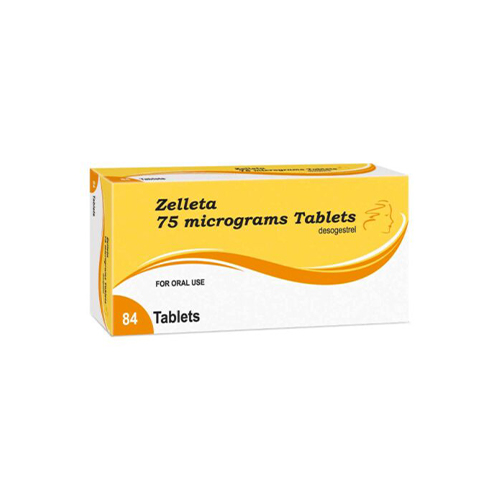- Effective contraception
- Alternative to Oestrogen
- Mini-pill
Zelleta
Zelleta tablets contain a small amount of one type of female sex hormone called desogestrel. In contrast to the combined pill, Zelleta can be used by women who do not tolerate oestrogen and by women who are breastfeeding.
What is Zelleta?
Zelleta 75 micrograms Tablets are used to prevent pregnancy.
Zelleta 75 micrograms Tablets contains a small amount of one type of female sex hormone, the progestogen desogestrel. For this reason, Zelleta 75 micrograms Tablets are called progestogen-only-pill (POP), or mini-pill.
In contrast to the combined pill, Zelleta 75 micrograms Tablets can be used by women who do not tolerate oestrogens and by women who are breastfeeding.
A disadvantage is that vaginal bleeding may occur at irregular intervals during the use of Zelleta 75 micrograms Tablets. You also may not have any bleeding at all.
How does Zelleta work?
Most POPs or minipills work primarily by preventing the sperm cells from entering the womb but they do not always prevent the egg cell from ripening, which is the main way that combined pills.
Zelleta 75 micrograms Tablets is distinct from other mini-pills in having a dose that in most cases is high enough to prevent the egg cell from ripening.
As a result, Zelleta 75 micrograms Tablets provide high (99%) contraceptive efficacy.
What you need to know before you take Zelleta
Do not take Zelleta 75 micrograms Tablets
- if you are allergic to any of the ingredients of Zelleta 75 micrograms Tablets.
- if you have thrombosis. Thrombosis is the formation of a blood clot in a blood vessel e.g. of the legs (deep venous thrombosis) or the lungs (pulmonary embolism).
- if you have or have had jaundice (yellowing of the skin) or severe liver disease and your liver is still not working normally.
- if you have or if you are suspected of having cancer that is sensitive to sex steroids, such as certain types of breast cancer.
- if you have any unexplained vaginal bleeding.
Possible interactions with other medicines and Zelleta
Some medicines may stop Zelleta 75 micrograms Tablets from working properly. These include medicines used for the treatment of
- epilepsy (e.g. primidone, phenytoin, carbamazepine, oxcarbazepine, felbamate and phenobarbital)
- tuberculosis (e.g. rifampicin)
- HIV infections (e.g. ritonavir), or other infectious diseases (e.g. griseofulvin)
- stomach upset (medical charcoal)
- depressive moods (the herbal remedy St. John’s Wort).
Your doctor can tell you if you need to take additional contraceptive precautions and if so, for how long.
Breast-feeding
Zelleta 75 micrograms Tablets may be used while you are breastfeeding. Zelleta 75 micrograms Tablets do not influence the production or the quality of breast milk.
However, a small amount of the active substance of Zelleta 75 micrograms Tablets passes over into the milk.
The health of children who were breast-fed for 7 months while their mothers were using another desogestrel-only pill has been studied up to 2.5 years of age. No effects on the growth and development of the children were observed.
How to take Zelleta
Each strip of Zelleta 75 micrograms Tablets contains 28 tablets. Every time you start a new strip, take a tablet from the top row. Don’t start with just any tablet. For example, if you start on a Wednesday, you must take the tablet from the top row marked (on the back) with WED.
Continue to take one tablet every day until the pack is empty, always following the direction indicated by the arrows. By looking at the back of your pack you can easily check if you have already taken your tablet on a particular day.
Take your tablet each day at about the same time. Swallow the tablet whole, with water. You may have some bleeding during the use of Zelleta 75 micrograms Tablets, but you must continue to take your tablets as normal. When a strip is empty, you must start with a new strip of Zelleta 75 micrograms Tablets on the next day – without interruption and without waiting for a bleed.
If you forget to take Zelleta 75 micrograms Tablets
- If you are less than 12 hours late:
Take the missed tablet as soon as you remember and take the next one at the usual time. Zelleta 75 micrograms Tablets will still protect you from pregnancy.
- If you are more than 12 hours late:
If you are more than 12 hours late in taking any tablet, you may not be completely protected against pregnancy. The more consecutive tablets you have missed, the higher the risk that you might fall pregnant. Take a tablet as soon as you remember and take the next one at the usual time. This may mean taking two in one day.
Continue to take your tablets as usual but you must also use an extra method, such as a condom, for the next 7 days.
If you vomit or have diarrhoea
Follow the advice for forgotten tablets in the section above. If you vomit within 3-4 hours after taking your Zelleta 75 micrograms Tablets or have severe diarrhoea, the active ingredient may not have been completely absorbed.
Side effects & precautions
Like all medicines, Zelleta 75 micrograms Tablets can cause side effects, although not everybody gets them.
Vaginal bleeding may occur at irregular intervals while using Zelleta 75 micrograms Tablets. This may be just slight staining which may not even require a pad, or heavier bleeding, which looks rather like a scanty period. You may need to use tampons or sanitary towels. You may also not have any bleeding at all. Irregular bleeding is not a sign that Zelleta 75 micrograms Tablets is not working.
Common
- mood changes
- depressed mood
- decreased sexual drive (libido)
- headache
- nausea
- acne
- breast pain
- irregular or no periods
- weight increase
Uncommon
- Infection of the vagina
- difficulties in wearing contact lenses
- vomiting
- hair loss
- painful periods
- ovarian cysts
- tiredness
You should see your doctor immediately if you experience symptoms of angioedema, such as (i) swollen face, tongue or pharynx; (ii) difficulty to swallow; or (iii) hives and difficulties breathing.




We’re here to help.
Our friendly team is available to help Monday to Friday 9:00am - 5:00pm.
If you need urgent assistance, do not use this service. Call 111, or in an emergency call 999.

